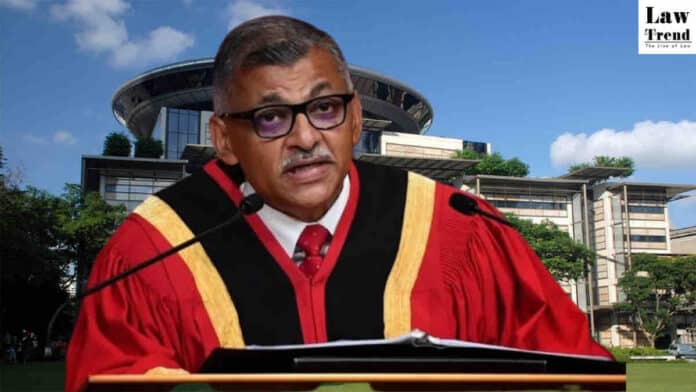A breakdown of trust in courts will be the failure of judiciary and result in the collapse of the rule of law, Chief Justice of Singapore Sundaresh Menon said here Saturday.
Speaking on “The Role of the Judiciary in a Changing World” at an event held to commemorate the 73rd anniversary of the Supreme Court of India, Justice Menon said courts should aim to become institutions that excel in the administration of justice.
“When it functions well, the judiciary serves as part of the glue that holds the various moving parts together….If this trust falls away, then the courts are left to operate solely by the force of state power, and the belief in and respect for the rule of law in our societies will collapse,” he said.

The event was attended by several dignitaries, including Chief Justice of India D Y Chandrachud, senior serving and former judges of the Supreme Court and the high courts and senior government functionaries.
Justice Menon, who proposed a vision for a future-ready judiciary, said judiciary cannot solely rely on the traditional ways to address the problem of “complexification” of disputes and will have to come up with radical ways to overcome it.
He said judges will increasingly need to be sensitive to developments in foreign laws to properly decide disputes. They will also need to actively cooperate with foreign counterparts for effective cross-border concurrent management, Justice Menon added.
“It cannot rely solely on traditional case management tools to address the problem of complexification of disputes. Judiciary will have to come up with new and radical ways to downsize disputes or face a real crisis of capacity.
“If the judiciary fails, it will lead to a breakdown of the rule of law. But if the judiciary is successful in dealing with the perfect long storm looming over us, they will help guide their societies through the tempest,” he said.
CJI Chandrachud also spoke on the occasion. He said the history of the Supreme Court is the history of the daily life struggles of Indian people.
“For the court, there are no big or small cases, every matter is important. Because it is in the seemingly small and routine matters involving grievances of citizens that issues of constitutional and jurisprudential importance emerge. In attending to such grievances, the court performs a plain constitutional duty, obligation, and function,” he said.
Observing that the Supreme Court of India is the busiest in the world, the CJ of Singapore said judges in India are among the hardest working judges because of the immense caseload they carry.
He said unequal accumulation of wealth will pose grave challenges with respect to access to justice for those left behind, who would feel increasingly marginalised and disillusioned with the justice system.
Increasing cost and complexity also hamper access to justice, he added.
Justice Menon said when the judiciary functions well, it acts as a glue to hold different parts of the system together.
The Chief Justice of Singapore said judges should also pay attention to the vast potential of technology.
Justice S K Kaul delivered the welcome address on the occasion and said the top court acts as an apex arbitrator of disputes.
Justice K M Joseph gave the vote of thanks.







